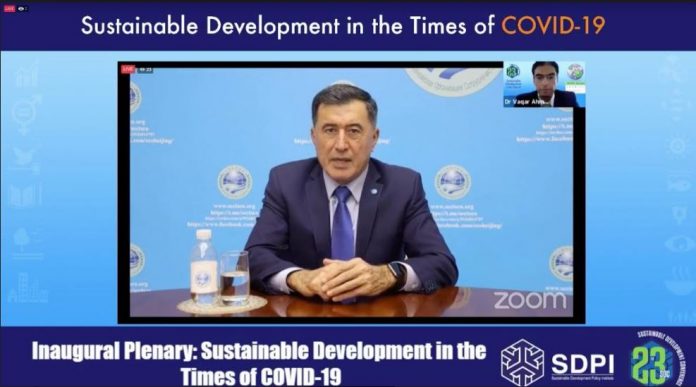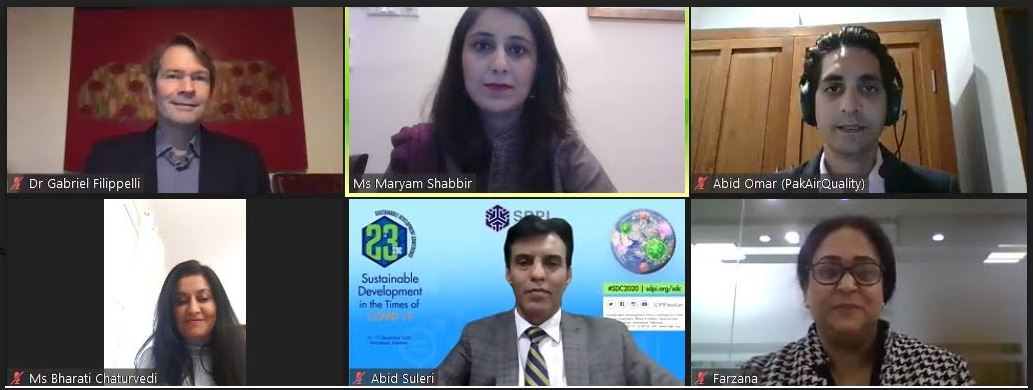ISLAMABAD, DEC 14 (DNA) – Vladimir Norov, the Secretary-General of Shanghai Cooperation Organization (SCO), has said that though coronavirus has incurred enormous damage to public health and global economy, it has brought new opportunities at the same time, accelerating the process of digital transformation in all sectors of life.
He was speaking at the inaugural plenary of 4-day 23rd Sustainable Development Conference (SDC) titled: Sustainable Development in the Times of COVID-19, inaugurated by the Sustainable Development Policy Institute (SDPI) in Islamabad on Monday.
Mr Norov said that the digital economy and cross-border e-commerce will play an increasingly important role in rebuilding the world economy after the COVID-19 in terms of achieving economic growth, increasing the competitiveness of economies and improving the quality of lives thus contributing to Sustainable Development Goals (SDGs). In times of COVID-19, global online retail sales are on the rise, and additional jobs are being created, he added.
“The SCO member countries see stability in Afghanistan as a need for regional peace and economic development,” Mr Norov said, adding that Afghanistan share borders with four SCO member states and its stability is crucial for peace and development of the entire region.
He said that this year’s SCO Summit concluded while finalizing an action plan for the implementation of the SCO development strategy 2025, which focuses on the early recovery of our economies from the pandemic.
Ambassador Shafqat Kakakhel, the chairperson of SDPI Board of Governors, in his welcome address, said since COVID-19 was declared a pandemic by the World Health Organization, this deadly disease has affected over 65 million people and killed half a million, including doctors, nurses, and other medical staff. Efforts to contain the spread of the virus through lockdowns restricting all kinds of human activities have led to huge financial losses.
Industrial production and trade, travel within and across countries, tourism, educational and cultural activities and normal health care facilities have been disrupted. These measures have impeded socio-economic development, accelerated unemployment, deepened poverty, disrupted food supply chain and threat to food security in many regions.
SDPI Executive Director Dr Abid Qaiyum Suleri highlighted the key facets of Food Security Dashboard which was developed jointly by SDPI and National Security Division, Government of Pakistan and will be launched during the upcoming days of the conference.
Dr Suleri said COVID-19 has negatively affected most aspects of Sustainable Development Goals. The pandemic has increased the incidence of poverty, food insecurity, diverted the resources from conventional diseases and elective surgeries to COVID-19, and deprived hundreds of millions of students from classrooms, he said, adding that for women and girls, it has turned into a shadow pandemic, and lack of access to clean water and sanitation facilities have aggravated the risk of spread of COVID-19.
“On the one hand, the core agenda of SGDs seems to be compromised, and on the other, there is a silver lining, as it has brought social sector development back on the radar of governments.” He said now the world governments simply can’t afford to compromise on health, social protection, and food security.
SDPI Joint Executive Director Dr Vaqar Ahmed said that SDPI looks forward to working with SCO secretariat in its endeavours to promote peace and development in the region. He said that the Action Plan for SCO development strategy is comprehensive and should provide an opportunity for all member countries to cooperate. He said that the digital transformation approach of SCO is welcomed and various sub regional economic corridors will contribute to regional integration.
Earlier, Speaking at a penal discussion on Setting Pakistan’s Agenda for Universal Social Protection (USP), Federal Minister for Interprovincial Coordination Dr Fehmida Mirza emphasized upon the importance of social protection as an indispensable art of policymaking – primarily to build coordination between the federal and provincial governments to remove financial barriers, enhance income and food security, protecting and providing jobs, and delivering social protection by structural reformation to address shocks like COVID-19 and alike.
Discussing the importance of universal social protection, Ingrid Christensen and Maiko Ouchi. Called upon equitable development and said it can’t replace the labor market policy. Consequently, access to social protection is recognized as a basic human right – with especial relevance to the SDG targets underpinning the need to leave no one behind.
Faisal Rifaq, the CEO of Prime Minister’s Health Insurance Scheme, Lire Ersado from World Bank Group and Haris Gazdar from IDEAS, remarked that good health is essential for the economic and social growth and national databases like NADRA have become indispensable.
Speaking at a panel titled: “Economic Growth, Social Protection, and the International IMF Programme amid COVID-19”, former Finance Minister Dr Hafiz A. Pasha said that we did not have a big number of COVID-19 cases in our country as compared to other developed and developing nations in the world, but still Pakistan has seen significant reduction in GDP growth. Our independent estimate is that growth fell by -2.5% during fiscal year 2019-20 and will only remain 1% during the ongoing fiscal year.
This is the largest decline since early 2000s. Almost 70% of the displaced workers are from the informal sector which will bring implications for welfare, he added. Furthermore, Dr. Pasha said that the stock of unemployed workers doubled due to COVID-19. “The Central Bank of Pakistan reduced the interest rate which was a big move and increased liquidity in transitional period. Remittances increased 27% thanks to abroad workers. Ehsaas programme also brought fruitful results. Main issue for the government is that there is still a fiscal crunch. There will be large debt servicing payments in the future. It seems that Pakistan has no option except to go back to IMF”, Dr Pasha concluded.
Dr Jochen Hippler, the Head of Friedrich-Ebert-Stiftung, Pakistan highlighting the different aspects about the COVID impact on national economy, said that development of vaccine for COVID-19 sadly operated by international powers like US and other European states.
Dr Bushra Yasmin from Fatima Jinnah Women University, Rawalpindi said that the poor are highly vulnerable to diseases and disasters. Pakistan’s score of social protection index is about 0.047, which is the lowest in the South Asia. She further said that this pandemic has hit the youth in terms of their jobs, education, and training.
Speaking at a concurrent session on Role of media amidst COVID-19 outbreak: From Pakistan and beyond, Joydeep Gupta, Senior Media Analyst from India, said a combination of ignorance and empathy has been observed in the overall media industry which needs special attention of the government.
Ram Sharam Sedhai, Senior media Analyst from Nepal, said media houses need to take special care of their reporters and other staff being the frontline forces by taking care of their physical activities at professional level. Senior anchors Asma Shirazi and Arifa Noor also spoke on the occasion.
Titles of other panels included: Education Methods in COVID-19 Response: Assessing Gendered Impact; and Literature, Language and Technology in the Time of COVID-19. A book Rah Guzar to Dekho by Karamat Ali was also launched.=DNA
===================

















